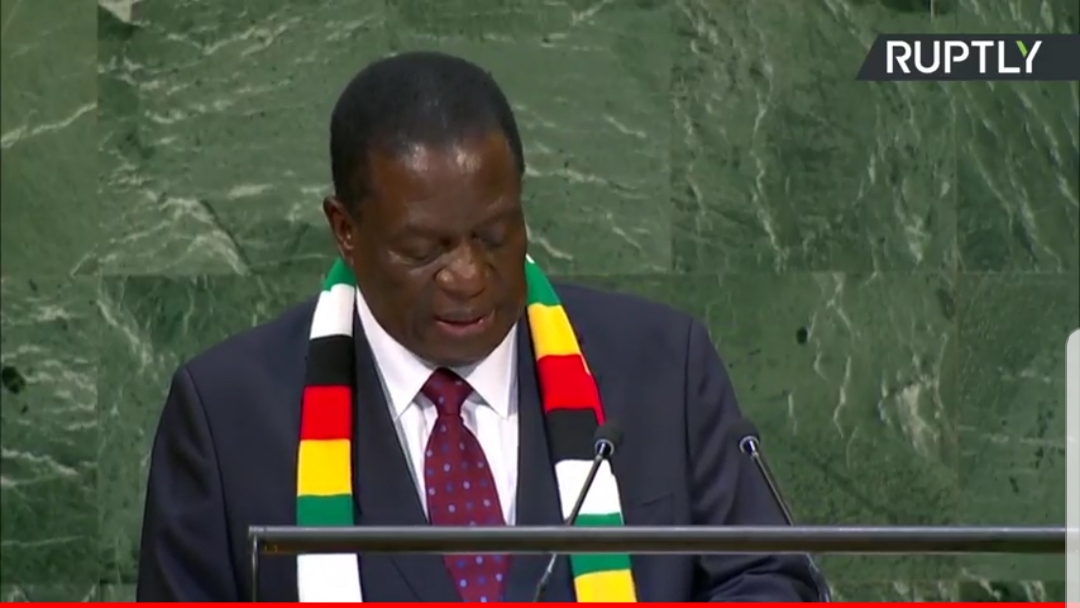Nothing, however, beats the sight and sound of President Mnangagwa making his maiden United Nations General Assembly (UNGA) summit address at the UN headquarters in New York on Wednesday, last week. It was an I-can’t-believe-it’s-happening moment for Zimbabweans at home and abroad who had become used to former President Robert Mugabe addressing the assembly. It was Zimbabwe’s hour to shine before the world – not because this was new but the President was representing the country under a new dispensation which is worlds apart from the previous one. It was an introduction of a new and refreshingly different administration in a country which had come to be known for economic regression and stagnation for almost two decades. The President’s speech represented a new socio-political era in which Government values and enjoys the society of other members of the community nations for its benefit and that of its people.
As President Mnangagwa stood before the whole world, he was not just perfunctorily going through the motions of the UNGA routine. He was the face of Zimbabwe. Unlike his predecessor, he was the personification of this new administration and all the good that it represents. He represented the opening of the political space which the world witnessed during the July election season. The President represented a new way of doing business which entails taking decisions such as departing from the tradition of staffing the Cabinet with ministers who the people felt were no longer bringing any value to the nation and adopting merit as the overarching criterion.
The President stood for ensuring that services such as road maintenance are carried out using the available resources as opposed to the previous administration which pointed to sanctions while the economy deteriorated. President Mnangagwa represented a new mindset in which the country looks both east and west in its relations with other nations fully cognisant of the fact that no nation can opt to be an island and survive for long. He stood for a Zimbabwe in which the national leadership acutely realises that the quality of life of its people rests in its hands. The President was the face of a new paradigm shift in which the leadership realises that if it does not make tough decisions and take serious actions to mend the economy and, by extension, the people’s lives, there would be no one to blame for the resultant state of the nation.
Apart from the President’s pedestal of prominence moment at the UNGA podium last week, he took time off his hectic schedule to meet Zimbabweans in the diaspora and businesspeople. The other highlight of his trip was his display of the unique character of his leadership which is characterised by listening to the people’s concerns. Zimbabweans in the diaspora came face to face with this trait of his leadership. If there were still any among them who thought that his “listening president” and “the voice of the people is the voice God” were merely election season mantras, they were silenced when they broached the diaspora vote issue, which the opposition has been using just for electoral and political expediency ahead of the July polls.
Those who raised the matter must have been pleasantly surprised beyond belief when President agreed with them that the nation needed to work out the necessary modalities to ensure that Zimbabweans in the diaspora exercise their constitutionally-guaranteed right to vote. It would not be surprising that some could have raised the matter to trap him into responding in the negative so that he would be cast in negative light by the international media, which was around in abundance.
“As I went round different countries, I met with Zimbabweans in the diaspora who insisted on wanting to have an opportunity to vote. I agree with that request. We now have five years where we can work on that objective where we can see whether we can implement it,” was the President’s response on the matter.
Perhaps the most significant import of the President’s visit to New York, last week, was the endorsement of his victory by the UN. If the global body, like Chamisa, believed that the President had rigged the elections, it would simply not have invited him let alone allow him a slot to address the summit. No one wants to be associated with controversy least of all a global body in the mould of the UN. If the opposition still nursed any doubts about the world’s view of its unsubstantiated rigging claims against the President, the UN, which is generally viewed as representative of the world, was unequivocal in the demonstration of its opinion on the elections. The UN and, indeed, the world have shown that they are more prepared to a stand behind Zimbabwe’s economic revival and global re-engagement and re-integration efforts than the opposition’s politics of spite.
Given the opposition’s bad week in the office during the UNGA summit, one is not surprised that it organised a poorly attended demonstration on Saturday to “tell the UN that (President) Mnangagwa is not Zimbabwe.” After the President’s meeting with Zimbabweans in America and businessmen who would want to demonstrate against him? Who in his right senses would demonstrate against the person who has agreed with their suggestion and pledged to work out ways of implementing the suggestion?
Given the foregoing, those who are close to the opposition leadership are advised to counsel it to concentrate on preparing for 2023 instead of consoling itself with false accusations as the President, Zimbabwe and the world are already moving forward.




